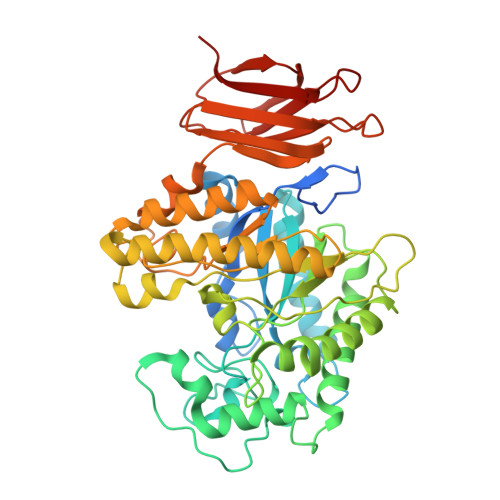Structural and Mechanistic Analyses of endo-Glycoceramidase II, a Membrane-associated Family 5 Glycosidase in the Apo and GM3 Ganglioside-bound Forms.
Caines, M.E., Vaughan, M.D., Tarling, C.A., Hancock, S.M., Warren, R.A., Withers, S.G., Strynadka, N.C.(2007) J Biological Chem 282: 14300-14308
- PubMed: 17329247
- DOI: https://doi.org/10.1074/jbc.M611455200
- Primary Citation of Related Structures:
2OSW, 2OSX, 2OSY - PubMed Abstract:
endo-Glycoceramidase, a membrane-associated family 5 glycosidase, deviates from the typical polysaccharide substrate specificity of other soluble members of the family, preferentially hydrolyzing glycosidic linkages between the oligosaccharide and ceramide moieties of gangliosides. Here we report the first x-ray crystal structures of an endo-glycoceramidase from Rhodococcus sp., in the apo form, in complex with the ganglioside G(M3) (Svennerholm ganglioside nomenclature (Svennerholm, L. (1964) J. Lipid Res. 5, 145-155)), and trapped as a glycosyl-enzyme intermediate. These snapshots provide the first molecular insight into enzyme recognition and association with gangliosides, revealing the structural adaptations necessary for glycosidase-catalyzed hydrolysis and detailing a novel ganglioside binding topology. Consistent with the chemical duality of the substrate, the active site of endo-glycoceramidase is split into a wide, polar cavity to bind the polyhydroxylated oligosaccharide moiety and a narrow, hydrophobic tunnel to bind the ceramide lipid chains. The specific interactions with the ceramide polar head group manifest a surprising aglycone specificity, an observation substantiated by our kinetic analyses. Collectively, the reported structural and kinetic data provide insight toward rational redesign of the synthetic glycosynthase mutant of endo-glycoceramidase to enable facile synthesis of nonnatural, therapeutically useful gangliosides.
- Departments of Biochemistry and Molecular Biology, Chemistry, and Microbiology, University of British Columbia, Vancouver, British Columbia, Canada.
Organizational Affiliation:




















